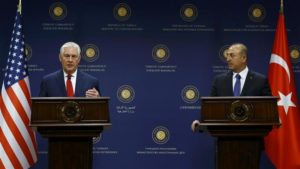by WorldTribune Staff, March 31, 2017
In a major policy shift from that of Barack Obama, U.S. Secretary of State Rex Tillerson on March 30 said the U.S. will no longer demand that Syrian President Bashar Assad step down as part of a negotiated solution to the Syrian crisis.
The “longer-term status of President Assad will be decided by the Syrian people,” Tillerson said during a news conference in Ankara with Turkish Foreign Minister Mevlut Cavusoglu.

State Department officials in Washington had been laying the groundwork for the change in policy for weeks, but Tillerson’s March 30 news conference made it official.
Nikki Haley, the U.S. ambassador to the United Nations, echoed Tillerson’s comments.
“Our priority is no longer to sit there and focus on getting Assad out,” Haley told a small group of journalists on March 30, according to Politico.
“Our priority is to really look at how do we get things done, who do we need to work with to really make a difference for the people in Syria,” she added. “We can’t necessarily focus on Assad the way that the previous administration did.”
During the news conference with Tillerson, Cavusoglu said he “absolutely” expects the U.S. to back away from its support for the Kurdish YPG. The Turkish minister based his assertion on what he said were numerous conversations between Turkish and U.S. officials, including a phone call between Turkish President Recep Tayyip Erdogan and U.S. President Donald Trump.
The U.S. has given no such assurances. A State Department official said the U.S. was “mindful” of Turkey’s concerns but added that the YPG has proven a “quite effective” ally in the fight against Islamic State (ISIS).
“This is unacceptable to us, the YPG poses a direct threat to Turkey,” Cavusoglu told CBS News last week. Turkey considers the YPG a terrorist group.
Meanwhile, Turkey continues to press the U.S. to hand over opposition cleric Fethullah Gulen, saying it has evidence he was involved in plotting last year’s coup attempt in Turkey.
On his visit to Washington last week, Cavusoglu said he brought new evidence of coup plotters receiving instructions from Gulen and his deputies to the Department of Justice. He said he personally met with Attorney General Jeff Sessions and that it was a “good meeting.”
The U.S. has only been willing to say that it is studying Turkey’s evidence against the cleric.
